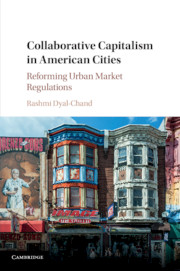Book contents
Part I - Collaborative Capitalism Defined
Published online by Cambridge University Press: 26 April 2018
Summary
- Type
- Chapter
- Information
- Collaborative Capitalism in American CitiesReforming Urban Market Regulations, pp. 15 - 72Publisher: Cambridge University PressPrint publication year: 2018



